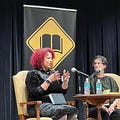Hard Histories Meets the 1619 Project
Baltimore’s CityLit Festival hosted Nikole Hannah-Jones in conversation with Martha Jones
Understanding how history is made, how our understanding of our society is shaped is very empowering; it’s also very frightening to people who benefit from that particular shaping. — Nikole Hannah-Jones
At Hard Histories at Hopkins our work often includes ferreting out myths, misunderstandings, and missing pieces that fuel the stories we tell about who we are and how we got here as a university. I was reminded of this last Saturday when I sat down with Nikole Hannah-Jones, investigative reporter for the New York Times Magazine and creator of the “1619 Project,” at Baltimore’s Enoch Pratt Library, courtesy of the CityLit Festival. It snowed, and still folks turned out and many others tuned in via live stream.
We got to talk about the force of myths in our thinking about the past and Hannah-Jones took us back to one of those moments when her reading of history shattered a myth. It led her to ask “How do we all come to know the same collective lies. And who are those lies in service of?” Those a-ha moments for a researcher may generate genuine discomfort in others: “Once you realize something is amiss here, there’s something happening behind this veneer, and once you question that, then you become dangerous to the people who are controlling the society.” Those who challenge myths can expect deliberate push-back, as a colleague explained to Hannah-Jones: “I knew you, and this work, was going to be attacked because this work is going against the mythic past and in a country that believes it’s based on an idea then if somebody bursts that idea they don’t believe that the nation can stand.”
At Hard Histories, we’ve done our share of myth-busting by testing stories against the historical record. We’ve learned that myths rarely come out of nowhere; frequently they are rooted in kernels of truth. In our December 2020 report, we traced how Johns Hopkins University came to regard Mr. Hopkins, its founder and namesake, as a Quaker and abolitionist while overlooking that he was a slaveholder. Myths are often also built upon partial — and consequently misleading - truths.
We call our project “Hard Histories” to signal that there is expertise and labor involved in replacing myths with history. History can also be hard as in difficult to take in and incorporate into our sense of self, as individuals and as institutions. And still, we believe by setting aside mistaken thinking about the past we open the door to new thinking about the future. When our imaginations are freed up so might our minds and our work be free to build new futures that are untethered from the burdens that myths impose.
Perhaps, as Hannah-Jones believes, the work of taking on myths evidences our capacities rather than our fragility. She told us: “We know better because we built the country; we know it’s strong.”
You can tune in for the entire interview here. And thanks to the CityLit Project and Pratt Library for making the conversation possible.
—MSJ



